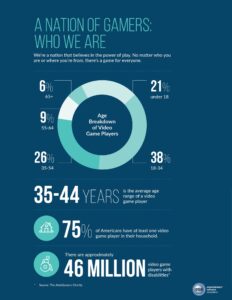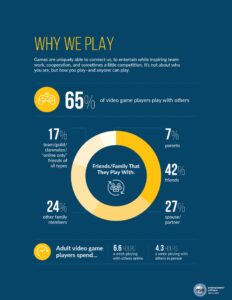Three-quarters of all US households include a gamer



A new report has found that over 214 million people in the US play games for at least one hour a week. It also shows that three-quarters of all US households include at least one gamer in them.
The report comes from ESA, and is their 2020 Essential Facts About the Video Game Industry report. The new report includes data from a survey in July 2020 of more than 4000 Amercians, which was conducted by Ipsos.
The conclusion of the report is that 64 percent of US adults, of which 70 percent are underage, and play games with an 18+ rating regularly. The report also shows that 38 percent of all gamers are aged between 18 and 34, with 21 percent being under 18, and 6 percent being over 65.
In total this makes for around 169 million US adult gamers, which is up from 164 million in 2019.
Breaking the data down by gender, the survey indicates that 41 percent of all US gamers are women. This could be down year-on-year, because the percentage was at 44 percent last year, and 45 in 2018. However, more people are gaming today than ever before, so the percentage may not have dropped at all comparatively.
Interestingly ESA has pointed out that the gender differences between gamers has shifted and bounced for the last five years. This year’s figures are nothing out of the ordinary as far as recent relevant data goes.
AbleGamers has chipped in with their own data, adding that 46 million gamers in the US have a disability.
73 percent of all US gamers indicated that they owned a console. 43 percent said that they had a handheld console, and 29 percent said that they had a VR system that they played on.
The survey also discovered that 87 percent of parents were aware of ESRB ratings, the ratings used to guide them on what content is in the games their children are playing. Last year that number was 98 percent, and those parents were confident in those ratings. However, this year only 83 percent of parents are confident about the accuracy of the ratings on the games their children are playing.
Of all the parents surveyed, 92 percent said that they paid attention to the games their children play, which is up by 2 percent year-on-year.
People seem to have lost faith in ratings because games like Fortnite can sneak what effectively equates to gambling without the correct rating being applied. It seems as though more parents are taking the time to play games for themselves, so that they understand what their children are being exposed to.


